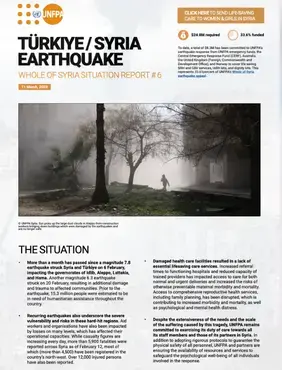More than a month has passed since a magnitude 7.8 earthquake struck Syria and Türkiye on 6 February, impacting the governorates of Idlib, Aleppo, Lattakia, and Hama. Another magnitude 6.3 earthquake struck on 20 February, resulting in additional damage and trauma to affected communities. Prior to the earthquake, 15.3 million people were estimated to be in need of humanitarian assistance throughout the country.
Recurring earthquakes also underscore the severe vulnerability and risks in these hard-hit regions. Aid workers and organisations have also been impacted by losses on many levels, which has affected their operational capacities. While casualty figures are increasing every day, more than 5,900 fatalities were reported across Syria as of February 12, most of which (more than 4,500) have been registered in the country’s north-west. Over 12,000 injured persons have also been reported.
Damaged health care facilities resulted in a lack of essential lifesaving care services. Increased referral times to functioning hospitals and reduced capacity of trained providers has impacted access to care for both normal and urgent deliveries and increased the risks of otherwise preventable maternal morbidity and mortality. Access to comprehensive reproductive health services, including family planning, has been disrupted, which is contributing to increased morbidity and mortality, as well as psychological and mental health distress.
Despite the extensiveness of the needs and the scale of the suffering caused by this tragedy, UNFPA remains committed to exercising its duty of care towards all its staff members and those of its partners in Syria. In addition to adopting rigorous protocols to guarantee the physical safety of all personnel, UNFPA and partners are ensuring the availability of resources and services to safeguard the psychological well-being of all individuals involved in the response.


